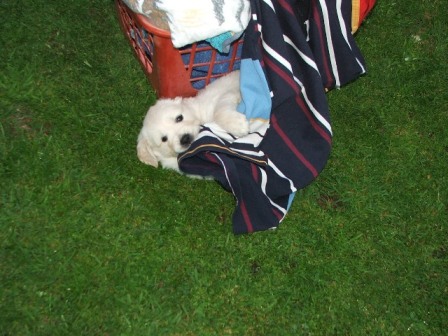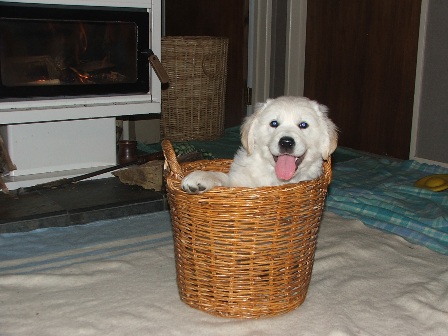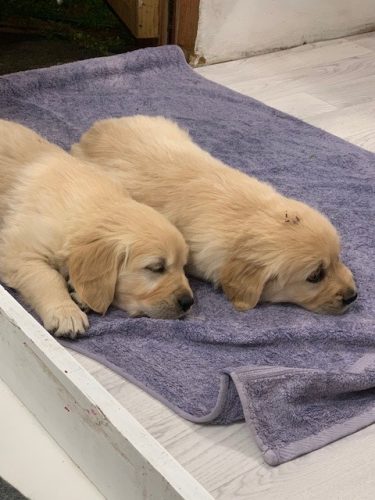Puppy Care Tips For First Time Owners
Exercise
Formal exercise on lead on hard surfaces should not commence until 6 months of age. These walks should be only 5 to 10 minutes long, increasing gradually to 40 minutes after your dog is 12 months old. Up until 6 months short romps in paddocks or parks and around home will be adequate to prevent damage to the puppy’s joints.
Grooming
Your dog will need regular grooming. You will need a good stiff brush and a dog comb, dog nail clippers and scissors. Grooming is a time you can spend together and a time to check puppies condition. It is also a good time to teach your puppy to stay still if you are going to show him/her as it will save a lot of time in the future.
BRUSHING AND BODY CHECK – Give puppy’s coat a good brush all over two or three times a week with a stiff brush. Use a comb on soft hair under puppies ears, between the legs (back and front) where the coat could matt. (While doing this, check the skin for any inflamed areas, lumps and scaly areas). While brushing ears, check them to see they are not inflamed, there is no discharge, offensive odour or foreign objects, e.g. grass seeds. Then check the face. The nails MUST be kept short, clipping is important. When clipping the nails, be careful not to cut the quick as it is painful for the dog and will bleed profusely. If you aren’t confident doing this, you can always take the dog to a groomer.
Bathing
We recommend bathing your dog weekly to keep the dogs coat clean and skin clean to reduce irritation and chance of sores. It is safe to bath your puppy providing you make sure puppy is properly dried afterwards and does not catch a cold. Johnsons baby shampoo or a dog shampoo are gentle enough for a dogs skin. Remember to completely rinse the soap out of the coat. Use a towel to dry your dogs ears by wrapping a portion of a towel around your fingers and dry the ear canal gently. This will not hurt or damage the ear. Do not use cotton buds in the ears. You can use a hand held hair dryer, this can be an advantage to get puppy used to this way of drying if you wish to show your dog later, they quickly become used to it. Be careful not to get the dryer too close to your dogs skin to avoid burning.
Dry skin. Some Golden Retrievers are prone to have mild dry skin. In these cases, once you have bathed your fluffy one, use a sensitive skin, aroma free, moisturizer. This will keep the skin healthy and stop your new family member from feeling itchy.
Reprimand
Most of the time if you reward the good behaviour and ignore the bad the bad behaviour will stop but for the times that a lesson must be taught for your dog’s safety or your own, a severe NO. If not, turn puppy on his/her back hold there until any struggling or eye contact stops, release puppy and praise. PLEASE remember to praise your puppy as soon as the undesirable behaviour stops. If this is not getting the desired effect, please feel free to contact us and we can provide you with some new tools. Physical violence can have a strongly negative effect on the puppy’s temperament.
Toilet Training
Take puppy outside every time puppy wakes from a sleep and when puppy has finished a meal, he/she will always want to go. Praise is the fastest way a puppy will learn. Between waking and meals take puppy out hourly, this should keep puddles at bay.
Play
A box full of ‘doggy’ toys is always a good idea because this takes away the temptation to chew the family ‘valuables’. If puppy is caught with a stolen possession i.e. Dad’s slipper, Mum’s stockings etc. take is gently from puppy and take him/her to their own toy box and give your puppy one of his/her own toys. He/she will soon learn where the fun things are. Safety is essential when choosing toys for puppy e.g. plastic squeaky toys for dogs, cheap soft toys from charity stores, his/her own pair of old slippers, a well made soft fabric ball.
When ever your puppy is playing with any other dogs make sure you supervise all the time to prevent any ROUGH PLAY, this can damage their bones and joints. Also no climbing up and down stairs, jumping off high areas or jumping into/out of cars; all these activities will damage bones and joints while your puppy is still growing. Be careful with these actions up until 12 months of age.
Housing
We prefer Goldens to be ‘inside’ dogs, being bred as companion dogs they need human companionship, and we owe it to them to spend as much time as possible with them. A well cared for, content, Golden is very quiet around the home and very clean in habits. In this environment their personality will develop to the full and be a joy to all. We still recommend they have a strong well constructed kennel and run outside (With fresh water) for the times puppy cannot go with you when you go out, so puppy will be safe and sheltered but able to be in the fresh air if desired.
A FULLY FENCED SECTION IS ESSENTIAL FOR YOUR DOGS SAFETY!
ALSO PLEASE REMEMBER – PUPPIES NEED A LOT OF REST AND SLEEP.



